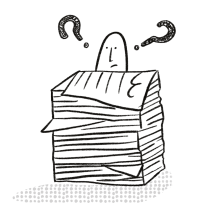How to apply for probate
Applying for probate can be a daunting task, but our specialists are here to make it feel simple. In this guide, you’ll find everything you need to know about going through probate and dealing with someone’s estate.
Part 1
What is probate?
Probate (short for ‘a grant of probate’) is a legal document that shows banks, the Land Registry and other organisations that you have the authority to deal with someone’s estate. It can take up to 16 weeks to get your document after you've applied.

Part 2
When is probate required?
Probate is usually required if the estate of the person who died is worth more than £10,000. However, if most of the assets in the estate were jointly owned, probate may not be needed at all.

Part 3
Do I need probate if my husband or wife dies?
You may need probate if your husband or wife dies and leaves behind assets that aren’t jointly owned with you. However, if you’re the joint owner of their property and bank accounts, probate may not be required.

Part 4
Who can apply for probate?
After losing a loved one, you may need to apply for probate before you can deal with their estate – but only specific people can handle the probate application. Here, we’ll look at who can apply and how you can get started today.

Part 5
How long does probate take in the UK?
The process of probate usually takes 1-3 months depending on the complexity of the estate. It can then take up to 6 months to close accounts, sell property and pay taxes.

Part 6
What information do you need before applying for probate?
Before applying for probate, you'll need to gather details about your loved one's estate. Here, we'll cover what you need, why, and how you can find it – and we’ve also got a free probate checklist to help you keep track of everything.

Part 7
How to get a death certificate in the UK
In order to get a death certificate, you need to register the death in a local register office. It’s free to register the death, but you’ll need to pay £11 for each copy of the death certificate.

Part 8
How to compare probate services and prices
Before choosing your probate provider, it’s worth shopping around to find the best service at the best possible price. Here, we’ll look at the main things you need to look out for when comparing probate services in England and Wales.

Part 9
What are letters of administration?
Letters of administration (also known as a grant of letters of administration) is a document issued by the probate registry. This allows someone to act as the administrator of an estate after someone has died.

Part 10
What does the probate registry do?
The probate registry is responsible for handling probate applications in the UK. Once an application has been approved, the probate registry will issue a grant of representation to either the executor or administrator of the estate.

Part 11
DIY probate: how to deal with someone's estate without paying expensive solicitor fees
Dealing with probate can be an expensive process. But by closing accounts, selling property and distributing assets yourself, you could save thousands in probate solicitor fees.

Part 12
How to get a grant of representation
A grant of representation is a document that allows you to deal with someone's estate. To get one, you need to collect up information about their estate, fill out a form and submit an application to the probate registry.

Part 13
How to find a probate solicitor in the UK
You can find a probate solicitor near you by searching online or in telephone directories. Or, if you would prefer to sort out probate over the phone, you could use our nationwide probate service.

Part 14
How to get probate without a will
To get probate without a will, you need to apply for a grant of letters of administration. This allows the next of kin to access the estate and distribute assets in line with the rules of intestacy – which we’ll explain in more detail here.

Part 15
How to find a will
You can usually find someone’s will with other important financial documents, such as bank statements and pension information. If you can’t find it in their house, you could search online to see if the will is recorded on the National Will Register.

Part 16
The duties of an executor: executor of will checklist
An executor of a will is responsible for dealing with the estate of the person who died. This includes valuing the estate, selling property, closing accounts, paying off debts and distributing assets to the beneficiaries named in the will.

Part 17
Deed of variation: how to vary your entitlement to someone’s estate after their death
A Deed of Variation allows beneficiaries to make changes to their entitlement following someone’s death. You cannot rewrite someone’s will after they've died, but the law does let you change what you're entitled to from the estate.

Part 18
Estate valuation: how to value a house and other assets for probate
To value a house for probate, it’s usually best to hire an RICS property surveyor – especially if the estate’s value is close to or above the inheritance tax threshold. For bank accounts and other assets, you can usually contact the organisations directly.

Part 19
What happens to debt when someone dies?
When someone dies with outstanding debt, it needs to be repaid from the estate before beneficiaries can get their inheritance. If there isn't enough money in the estate to pay it off, the debt is simply written off.























